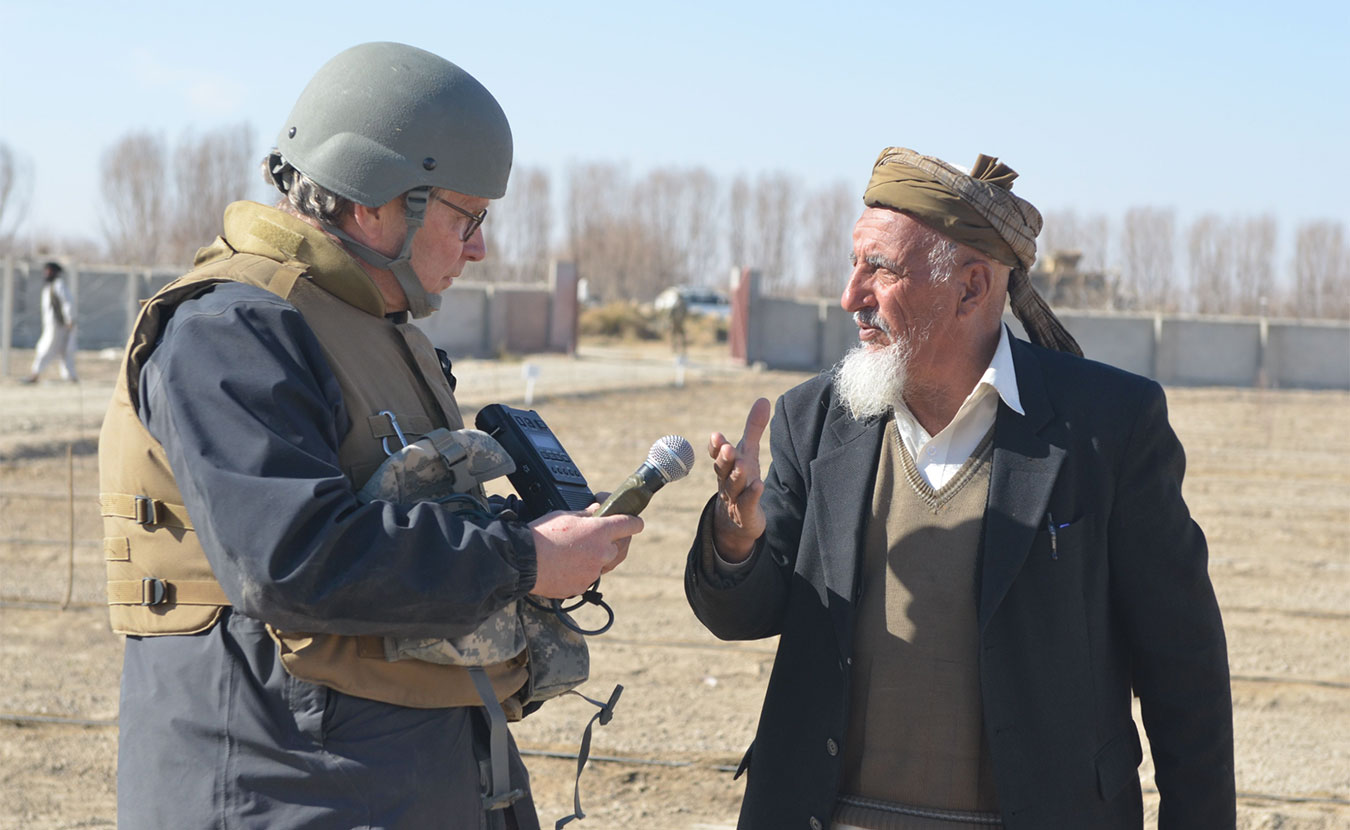“Imagine how we would react to eight-foot-tall Taliban on armored flying carpets. They come swooping in and tell all our women to put on burkas. I’d be thinking the shotguns’d be coming out!”
So says Doug Wissing, our town’s reigning expert on the situation on the ground — and in the hills — in war-torn Afghanistan. He reminds us our fight in that central Asian land is our longest-lasting and most expensive foreign entanglement by far. He’s spent plenty of time there, embedded with agribusiness development teams — combat troops offering Afghan mountain villagers the chance to transform themselves into good old, down-home farm boys.

Author Doug Wissing in Afghanistan. | Photo courtesy of Indiana National Guard Agribusiness Development Team
Problem is, according to Wissing, the Afghans are not altogether pleased with our unbidden visits and unwelcome offers. He’s spelled out the folly of the war in two books, Funding the Enemy: How US Taxpayers Bankroll the Taliban (Prometheus Books, 2012), and Hopeless but Optimistic: Journeying through America’s Endless War in Afghanistan, recently published by Indiana University Press — both scathing indictments of the blood and money swamp that is Afghanistan.
“I went out there three times and embedded with different military units around the east and south of Afghanistan where the insurgency is raging,” he says. “I spent time in the Pashtun regions prior to 9/11, so I had some sense of the Pashtun people, who are the insurgent group in Afghanistan. Primarily, they comprise the Taliban. So I had some sense of those folks before the war started in 2001.”
One day several years ago, Wissing read an article in the International Herald Tribune (now called the New York Times International Edition) about teams of National Guard soldiers specializing in farming. The article mentioned an Indiana agribusiness team, giving him the idea to write an article on that unit. Wissing tracked it down, and when he met its members he was so impressed that he asked if he could travel with them to Afghanistan. He’s met and embedded with several such teams since.
“They were unique because they could go out whenever they wanted. Ninety percent of the American soldiers never leave their bases. They never ‘break the wire.’ The agribusiness development teams did just the opposite. They did hundreds of missions out into Afghanistan.”
Wissing embedded with teams from Texas, Kentucky, Kansas, Mississippi, South Carolina, and Indiana. “Because they were doing development,” Wissing explains, “because they were involved with combat missions, because they had to coordinate with all the combat teams, because they were involved with the Afghan government, because they were essentially negotiating with the Taliban shadow government, I was able to see every aspect of the war in Afghanistan.”

When Wissing met the members of an Indiana agribusiness team, he was so impressed that he asked if he could travel with them to Afghanistan. | Photo courtesy of Indiana National Guard Agribusiness Development Team
Wissing donned the tawny tactical clothes of the front lines, and strapped on the same types of helmet, goggles, and body armor his soldier-hosts wore. He hooked the same kind of first-aid kit and multiple tourniquets to his webbing. He watched and listened as the development teams dropped in on the Afghans.
“If you can imagine,” he says, “you’re in a convoy of armored vehicles grinding up switchbacks into these, essentially, 13th century villages. The security soldiers get out first. They’re dressed in 50 pounds of body armor. They’re carrying 75 pounds of weaponry and ammunition. There are machine gunners on top of the armored vehicles. Sometimes there’s going to be an Apache helicopter circling above. The Afghans come out and they sit down with you under the shura tree, the meeting tree, the shade tree at the edge of the village. Then these kind of storm troopers start saying, ‘Well, do you want this project? Do you want that?’ With that comes this whole western expectation of We’re going to modernize, we’re going to change the way your culture is.”
Wissing says the combined U.S. State Department and Pentagon request for funding the Afghanistan operation for the fiscal year 2017 totaled $44 billion, dwarfing our expenditure for the better-known Syria/ISIS campaign, a mere $5 billion. “We’ve been doing this for fifteen years now,” Wissing says. “The total bill, just for Afghanistan, is now over a trillion dollars.”
The Vincennes native is convinced that money and countless lives have been wasted. He points out that in 2001, Afghanistan ranked near the very bottom in many human development indexes, like life expectancy, literacy, electricity, and so on. Today? After receiving well over $100 billion of US taxpayer money on aid and development — more than the Marshall Plan, adjusted for inflation — Afghanistan still ranks near the bottom in those areas.
“We have failed at our military and diplomatic goals,” Wissing says. “The Taliban has been growing in strength by double-digit numbers every year since at least 2005. They control more ground now than they ever have. Some analysts tell me they’re controlling 90 percent of the country.”
The Pashtuns are part of a millennia-old warrior culture. Wissing says they and their forebears have defeated Alexander the Great, Genghis Kahn, the British Empire (three times!), and the Soviet Union. The Americans? “What we’re looking at now is essentially a failed war,” Wissing says. “A Kentucky sergeant said to me, ‘The Afghans ain’t buyin’ what we’re sellin’.’”
Wissing has spoken with front-line diplomats, grunt soldiers, officers, military academics, experts on the region, and many others. “I’ve discovered there is the toxic network that connects ambitious American careerists, for-profit military-industrial and development-industrial corporations, extremely corrupt Afghan insiders, and the Taliban. Everybody is in on the take.”
It takes a remarkably focused and committed researcher to unearth the facts, inconvenient and otherwise, about the morass in Afghanistan. Wissing from a very early age showed signs of that kind of concentration. “I grew up in the great era of print literature,” he recalls. “In Vincennes, this tiny little town, I read four newspapers a day. The Carnegie Library was about two blocks from my house. I could walk there from the time I was six years old. There were two big streets I had to cross.” He spent countless hours at the reading tables, closing up his books only when the librarian, Miss Batman, wanting to go home, tapped him on the shoulder.
He studied history and political science at Indiana University and used that training to bolster his case in his first book on Afghanistan, Funding the Enemy. The thing is chock-full of thousands of citations. Hopeless but Optimistic, though, is more accessible to the casual reader. “I want to present what it’s like moving through a failed war to the broadest possible audience. It’s basically storytelling. There are these vignettes, these little short chapters — This is what it’s like to be here. Here are some funny things that happened — black humor, ‘Catch-22’ kind of humor, how crazy this war is now.”
Wissing’s torn when asked if he’d like to return to Afghanistan. “I find the mountain people fascinating,” he says. He has a real affection for the Pashtuns, no matter how “backward” Americans might view them. But going back might mean immersing himself in the quagmire again. “This has become the forgotten war,” he says. “We don’t want to think about it. In the meantime this thing goes on.”




No Replies to "Big Mike’s B-town: Doug Wissing, Embedded Journalist"